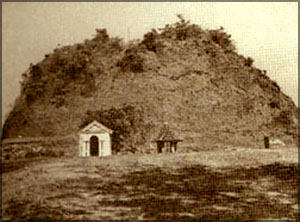|

Sri Lankan waters heavily polluted
The waters around Sri Lanka are among the most heavily damaged and
polluted ocean regions in the world, a study has revealed.
 The research by a team of American, British and Canadian researchers
was published in the journal Science. The research by a team of American, British and Canadian researchers
was published in the journal Science.
Activities like water and air pollution, overfishing, commercial
shipping or greenhouse gas emission are continually damaging the planet
and there is no sign that they will ever stop.
Apparently, the most affected areas are the North and Norwegian seas,
South and East China seas, Eastern Caribbean, North American eastern
seaboard, Mediterranean, Persian Gulf, Bering Sea and the waters around
Sri Lanka, the study said.
The survey, analysed all 17 activities through which humans impact
the oceans, and their conclusion was that every square mile of the ocean
has been damaged in some way.
The researchers have designed a map that emphasises and explains the
results of their study. The map was released at the annual meeting of
the American Association for the Advancement of Science in Boston and
published in Science, the Associated Press reports.
"Our results show that when these and other individual impacts are
summed up, the big picture looks much worse than I feel most people
expected. It was certainly a surprise to me," said lead author Ben
Halpern, an assistant research scientist at the National Center for
Ecological Analysis and Synthesis at the University of California, Santa
Barbara, according to the Associated Press.
The oceans around the polar areas are the least affected, but
scientists predict they will be damaged more and more in the following
years, as long as the global warming continues.
"There were two things we didn't anticipate," Halpern added. "Every
single spot in the oceans was affected by at least one human activity
... we figured there'd be places people just hadn't gotten to yet."
Some good news is that, in the Congress, the House voted the approval
of $454 million for ocean exploration programmes and studies over the
next seven years, at the National Geographic and Atmospheric
Administration.
Ben Halpern still has hope that things can be improved.
"There are some areas in fairly good condition. They are small and
scattered, but have fairly low impact. That suggests that with effort
from all of us, we can try to protect these patches and use them as a
guideline for what we'd like the rest of the ocean to start looking
like," he stated.
e-News
Computer centres for plantation schools
A knowledge of computers is a must in the modern world and almost all
schools nowadays have computer and IT training centres. Some schools in
the plantation sector may have been lagging behind in this area due to
the lack of facilities, but things are slowly changing for the better.
Steps are being taken to provide IT facilities for plantation sector
students. One such project is the planned establishment of 10 computer
training centres in the plantation sector of Kandy, Nuwara Eliya and
Matale.
It would be carried out under the Indian Lead Project with financial
assistance from the Indian Government, on the initiative of the Central
Provincial Education Ministry. It has been planned to provide 15
computers to each centre and the project is estimated to cost Rs. 20
million.
The Indian Government has also provided facilities for plantation
sector teachers to undergo training in Maths, Science and English in
Indian universities.
SAARC nations to fight illegal wildlife trade
The eight SAARC countries have agreed to work jointly to tackle the
region's illegal wildlife trade that has assumed alarming proportions.
The countries have come under the banner of the South Asia Co-operative
Environment Programme (SACEP), an inter-governmental organisation, to
tackle illegal trade.
|

Tigers, a species reaching extinction as a result of illegal
wildlife trade |
The South Asian region is a storehouse of biological diversity and
rich terrestrial (on land), freshwater and marine resources. As a
result, illegal trade and over-exploitation of wild animals and plants
pose a major challenge to the conservation and sustainable use of
biodiversity in the region.
In a first regional workshop held in Kathmandu, Nepal, the group
agreed to a series of joint actions as part of a South Asia Wildlife
Trade Initiative (SAWTI). This includes setting up of a South Asia
Experts Group on Wildlife Trade and development of a South Asia Regional
Strategic Plan on Wildlife Trade (2008-2013).
The SACEP was established in 1982 for promoting regional co-operation
in South Asia in the field of environment.
The group includes Afghanistan, Bangladesh, Bhutan, India, the
Maldives, Nepal, Pakistan and Sri Lanka. The workshop was organised by
the Nepal Ministry of Environment, Science and Technology, SACEP, World
Wide Fund for Nature (WWF) Nepal and TRAFFIC, the wildlife
trade-monitoring network.
Senior wildlife officials from these countries have called upon the
international community to support action in South Asia by providing
financial and technical assistance in the implementation of the regional
plan, an official statement of TRAFFIC said. The Kathmandu workshop has
agreed to focus on a number of key areas of work.
These include co-operation and co-ordination, effective legislation
policies and law enforcement, sharing knowledge and effective
dissemination of information, sustainability of legal trade and
livelihoods security, intelligence networks and early warning systems
and capacity building.
Nepal's Minister for Environment, Science and Technology Farmullah
Mansoor said his Government is committed towards combating the illegal
wildlife trade in the region. Nepal currently holds the chair position
of SACEP's South Asia Governing Council.
SACEP Director-General Arvind A. Boaz said: "The agreement reached on
SAWTI puts in place the foundations for a co-operative effort to crack
down on illegal trade and to improve the management of wild species that
can be legally traded under national laws in the region."
"SAWTI is the first wildlife trade initiative of its kind in South
Asia and SACEP is confident it will lead to further commitment in the
region, and closer engagement among neighbours to effectively address
wildlife trade problems," Boaz added.
WWF Nepal's Country Director, Anil Manandhar said the greatest
challenge was combating the highly organised illegal trade networks
between poachers, domestic and international traders of wildlife
products, combined with highly porous borders between some countries.
"No single nation can control such illegal activities alone," he
said.The decisions of this workshop will be presented for endorsement at
ministerial level at the Eleventh Meeting of the Governing Council of
SACEP, which will take place in New Delhi later this year.
IANS
Deeghavapi to be developed as sacred area
Deeghavapi, a historic place of Buddhist worship near Ampara in the
Digamadulla district, is to be developed as a sacred area by the Urban
Development and Sacred Area Development Ministry.
 A proposal to declare Deeghavapi as a sacred area, presented by
Minister Dinesh Gunawardena, has already received Cabinet approval. A proposal to declare Deeghavapi as a sacred area, presented by
Minister Dinesh Gunawardena, has already received Cabinet approval.
A news release from the Ministry said the Buddha is believed to have
stayed at Deeghavapi with 500 arahat theras during His third visit to
Sri Lanka. Prince Saddhatissa (earlier known as Tissa) had built the
dagoba and reservoir here in 137 BC during his brother, King
Dutugemunu's reign (See also our article on Heritage Splendour).
Under the Deeghavapi sacred area development scheme, the National
Physical Planning Department will carry out work on Perahera Mawatha,
resting halls, danasalas, trade and exhibition stalls and other
infrastructure facilities.
Meanwhile, the Archaeology Department will undertake the conservation
of the dagoba and Salapathala Maluwa and the construction of an
archaeological museum.
The development of the sacred area is expected to contribute towards
the overall socio-economic development of the region and is also
expected to attract more devotees as well as local and foreign tourists
to the area.
Fresh milk gaining in popularity
Milk stalls numbering 118 have been opened in Colombo, Kalutara,
Kandy, Nurawa Eliya, Kurunegala and Puttalam as part of the programme to
popularise the consumption of fresh milk instead of imported milk
powder.
 The initiative, launched by the Livestock Development Ministry, is
said to be making rapid progress. Milk stalls have already been opened
at 12 schools, three universities and three technical colleges to
promote fresh milk consumption among students. These stalls have been
set up at a cost of Rs. 59 million, with funding from the Ministry and
the National Livestock Development Board. The initiative, launched by the Livestock Development Ministry, is
said to be making rapid progress. Milk stalls have already been opened
at 12 schools, three universities and three technical colleges to
promote fresh milk consumption among students. These stalls have been
set up at a cost of Rs. 59 million, with funding from the Ministry and
the National Livestock Development Board.
Nearly 5,500 litres (30,000 cups) of milk are sold each day through
these stalls. They are also selling milk-based food items, which would
benefit medium and small scale industrialists as well.
Many doctors have pointed out the health and nutritional benefits of
fresh milk as opposed to dried milk powder. Promoting fresh milk can
also save substantial foreign exchange, which is currently spent, on
bringing down milk powder from abroad.
Currently, only 15 per cent of the demand for milk is produced
locally. It is hoped to increase this to 50 per cent by 2015 with the
provision of hybrid animals and farm equipment and technology to farmers
for setting up more dairies. |
